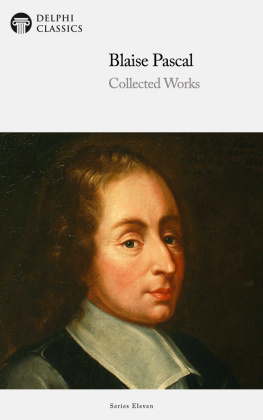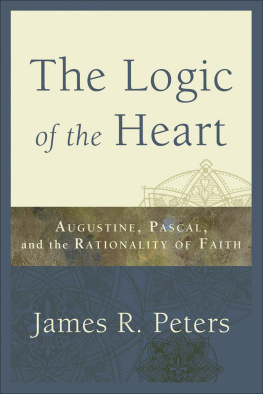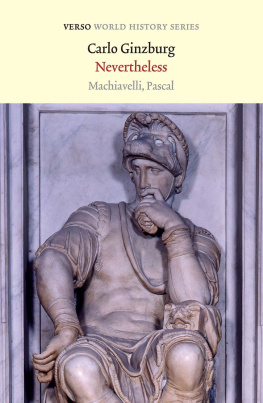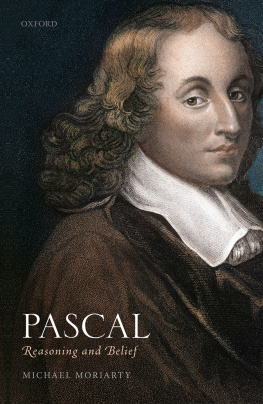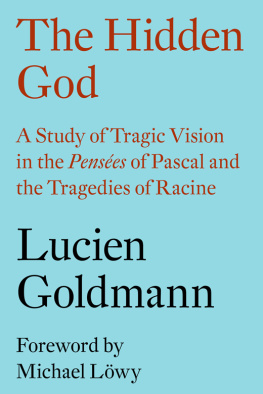Blaise Pascal was born in Clermont in 1623, the son of a government official. During his short life he left his mark on mathematics, physics, religious controversy and literature. A convert to Jansenism, he engaged with gusto in a controversy with the Jesuits, which gave rise to his Lettres Provinciales on which, with the Penses, his literary fame chiefly rests. A remarkable stylist, he is regarded by many as the greatest of French prose artists. He died, after a long illness, in 1662.
Dr A. J. Krailsheimer was born in 1921 and was Tutor in French at Christ Church, Oxford, from 1957 until his retirement in 1988. His publications are Studies in Self-interest (1963), Rabelais and the Franciscans (1965), Three Conteurs of the Sixteenth Century (1966), Rabelais (1967), A. J. de Ranc, Abbot of La Trappe (1974), Pascal (1980), Conversion (1980), Letters of A. J. de Ranc (1984), Ranc and the Trappist Legacy (1985), Correspondance de Ranc (1991), Floritge de Lettres de Ranc (1999) and A. J. de Ranc, abb de la Trappe (revised French edition of the 1974 book for the Tercentenary in 2000). He has also translated Flauberts Three Tales (1981), Balzacs Pre Goriot (1991) and Hugos Notre Dame de Paris (1993) for Oxford Worlds Classics, and Flauberts Bouvard and Pcuchet and Salammb, and Pascals The Provincial Letters for the Penguin Classics.
Introduction
1
An author of two widely celebrated works on religion (and much else) who enjoys the reputation of being a brilliant mathematician, a scientist of proven ability, a technologist capable of designing and constructing a calculating machine and devising and seeing inaugurated the first public transport service in Paris, may well expect to be labelled dilettante. Yet Pascal gained the admiration and respect of his contemporaries by his outstanding gifts as mathematician, scientist and technologist quite independently of the fame that accrued to him at the end of his life from his literary and religious work, which has never been more in honour than today. It is as a Frenchman of all-round distinction that Pascals portrait was chosen for the 500franc banknote issued by the Banque de France. The word genius is perhaps overworked, yet it can properly be applied to Pascal, whose work on probability, barometric pressure, the vacuum and many other problems put him in the front rank of European intellectuals. Fermat and Descartes in France, and Christopher Wren and Christiaan Huygens abroad, were among those who recognized his gifts.
As a writer he compelled attention with the Provincial Letters (16567). Since these appeared clandestinely and anonymously, the success they at once achieved owed nothing to the unknown authors previous reputation. The Letters showed that readers with no special knowledge or qualifications in theology or casuistry could have such matters explained to them in such a way that they felt competent to pass judgement on the practices and abuses attributed to the Jesuits. The interview technique exploited with such devastating effect in the earlier letters has been likened to that of modern journalism, and in this as in so many other aspects of his work Pascal was ahead of his time. The sureness and lightness of touch revealed in the Provincial Letters would assure Pascal of an honourable mention in the literary history of a century of outstanding French prose writers. It should be remembered that the issues involved in the Letters were deadly serious, even if Pascals gift for exposing duplicity and inconsistency made the whole affair look ridiculous.
The Penses, therefore, first published in 1670, eight years after Pascals death, are by no means the main, let alone sole, cause of Pascals fame in his own time. The man whose conversion in 1654 led him to see intellectual achievement as a distraction from the search for reality was not a failure looking for compensation in withdrawal. It was his very success, most recently in defending his friends at Port Royal by the Provincial Letters, which is the background to the Penses.
The constraints and limitations of seventeenth-century ideas about God and man are very different from those of the present day, but only now can the reader look at a text left by Pascal not rearranged to fit an individual editors preconceptions. It is remarkable how wide a public shows interest in the work, surely transcending curiosity or problem solving. Perhaps comparative ignorance of the historical background is an aid to enjoyment, perhaps individual readers put their own construction on the work to the point that misunderstanding becomes fruitful; whatever the reason Pascal seems to speak to modern readers with quite particular force.
2
Attempts are still made to explain Pascal and the Penses in terms of his heredity, class-background and even physiology, and, lamentably as these have failed, there are indisputably some grounds for beginning with what is objectively verifiable. Born on 19 June 1623, Pascal lost his mother when he was only three, and was brought up with his two sisters, Gilberte and Jacqueline, entirely by his father, tienne Pascal, a legal officer of substance at Clermont (now Clermont-Ferrand). In 1631 tienne Pascal left Auvergne and installed his family in Paris, where he directed Blaises education himself, setting high standards and demonstrating clear principles to such effect that the twelve-year-old boy is reported to have discovered for himself the first thirty-two propositions of Euclid. The family stayed in Paris until 1640, when tienne, reconciled with Richelieu after a bold but imprudent protest against the financial policy of the government, was appointed Commissioner for Taxes in Upper Normandy and moved to Rouen.
These early years undoubtedly left their mark on Blaise. Deprived from an early age of a mothers care, he was always of sickly constitution and was, moreover, an only son between an older and a younger sister. He was inevitably given extra, perhaps excessive, consideration, and his precocious intelligence can only have increased his individualism. At the same time, this unusual family situation seems to have aroused in him an attitude to human affection which came out in later life with such reactions as his censure of Gilberte, by then married to her cousin Florin Prier, for exchanging caresses with her children. He found such visible marks of affection not only distasteful, but morally wrong; the basis for such a judgement may be surmised from certain of the Penses (e.g. 396).
His education, too, could not fail to produce a marked effect on his character, lasting throughout his life. While his fathers direct supervision enabled him to make rapid, even spectacular progress and encouraged the highest degree of independent judgement based on sound principles, his isolation from boys of his own age and from the society and discipline of school life may have protected him from psychological, and physical, discomfort, but allowed him to have his own way too much in formative years. To his fathers enthusiasm for mathematics, and to many intellectually distinguished friends, Blaise certainly owed a great deal, and perhaps even more to the humane and enlightened methods of a widower who could so easily have become an authoritarian crank.


